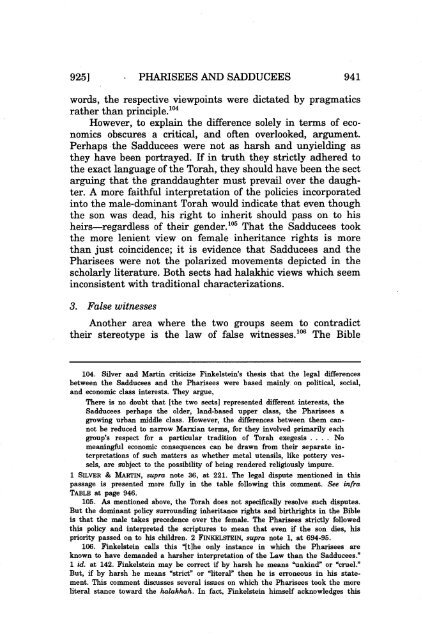The Pharisees and the Sadducees: Rethinking Their Respective ...
The Pharisees and the Sadducees: Rethinking Their Respective ...
The Pharisees and the Sadducees: Rethinking Their Respective ...
Create successful ePaper yourself
Turn your PDF publications into a flip-book with our unique Google optimized e-Paper software.
9251 - PHARISEES AND SADDUCEES 941<br />
words, <strong>the</strong> respective viewpoints were dictated by pragmatics<br />
ra<strong>the</strong>r than principle.lo4<br />
However, to explain <strong>the</strong> difference solely in terms of eco-<br />
nomics obscures a critical, <strong>and</strong> often overlooked, argument.<br />
Perhaps <strong>the</strong> <strong>Sadducees</strong> were not as harsh <strong>and</strong> unyielding as<br />
<strong>the</strong>y have been portrayed. If in truth <strong>the</strong>y strictly adhered to<br />
<strong>the</strong> exact language of <strong>the</strong> Torah, <strong>the</strong>y should have been <strong>the</strong> sect<br />
arguing that <strong>the</strong> gr<strong>and</strong>daughter must prevail over <strong>the</strong> daugh-<br />
ter. A more faithful interpretation of <strong>the</strong> policies incorporated<br />
into <strong>the</strong> male-dominant Torah would indicate that even though<br />
<strong>the</strong> son was dead, his right to inherit should pass on to his<br />
heirs-regardless of <strong>the</strong>ir gender.'" That <strong>the</strong> <strong>Sadducees</strong> took<br />
<strong>the</strong> more lenient view on female inheritance rights is more<br />
than just coincidence; it is evidence that <strong>Sadducees</strong> <strong>and</strong> <strong>the</strong><br />
<strong>Pharisees</strong> were not <strong>the</strong> polarized movements depicted in <strong>the</strong><br />
scholarly literature. Both sects had halakhic views which seem<br />
inconsistent with traditional characterizations.<br />
3. False witnesses<br />
Ano<strong>the</strong>r area where <strong>the</strong> two groups seem to contradict<br />
<strong>the</strong>ir stereotype is <strong>the</strong> law of false witnesses.'" <strong>The</strong> Bible<br />
104. Silver <strong>and</strong> Martin criticize Finkelstein's <strong>the</strong>sis that <strong>the</strong> legal differences<br />
between <strong>the</strong> <strong>Sadducees</strong> <strong>and</strong> <strong>the</strong> <strong>Pharisees</strong> were based mainly on political, social,<br />
<strong>and</strong> economic class interests. <strong>The</strong>y argue,<br />
<strong>The</strong>re is no doubt that [<strong>the</strong> two sects] represented different interests, <strong>the</strong><br />
<strong>Sadducees</strong> perhaps <strong>the</strong> older, l<strong>and</strong>-based upper class, <strong>the</strong> <strong>Pharisees</strong> a<br />
growing urban middle class. However, <strong>the</strong> differences between <strong>the</strong>m cannot<br />
be reduced to narrow Marxian terms, for <strong>the</strong>y involved primarily each<br />
group's respect for a particular tradition of Torah exegesis . . . . No<br />
meaningfbl economic consequences can be drawn from <strong>the</strong>ir separate interpretations<br />
of such matters as whe<strong>the</strong>r metal utensils, like pottery vessels,<br />
are subject to <strong>the</strong> possibility of being rendered religiously impure.<br />
1 SILVER & MAWIN, supm note 36, at 221. <strong>The</strong> legal dispute mentioned in this<br />
passage is presented more fully in <strong>the</strong> table following this comment. See infra<br />
TABLE at page 946.<br />
105. As mentioned above, <strong>the</strong> Torah does not specifically resolve such disputes.<br />
But <strong>the</strong> dominant policy surrounding inheritance rights <strong>and</strong> birthrights in <strong>the</strong> Bible<br />
is that <strong>the</strong> male takes precedence over <strong>the</strong> female. <strong>The</strong> <strong>Pharisees</strong> strictly followed<br />
this policy <strong>and</strong> interpreted <strong>the</strong> scriptures to mean that even if <strong>the</strong> son dies, his<br />
priority passed on to his children. 2 FINKELSTEIN, supra note 1, at 694-95.<br />
106. Finkelstein calls this "[tlhe only instance in which <strong>the</strong> <strong>Pharisees</strong> are<br />
known to have dem<strong>and</strong>ed a harsher interpretation of <strong>the</strong> Law than <strong>the</strong> <strong>Sadducees</strong>."<br />
1 id. at 142. Finkelstein may be correct if by harsh he means "unkind" or "cruel."<br />
But, if by harsh he means "strict" or "literal" <strong>the</strong>n he is erroneous in his statement.<br />
This comment discusses several issues on which <strong>the</strong> <strong>Pharisees</strong> took <strong>the</strong> more<br />
literal stance toward <strong>the</strong> halakhah. In fact, Finkelstein himself acknowledges this


